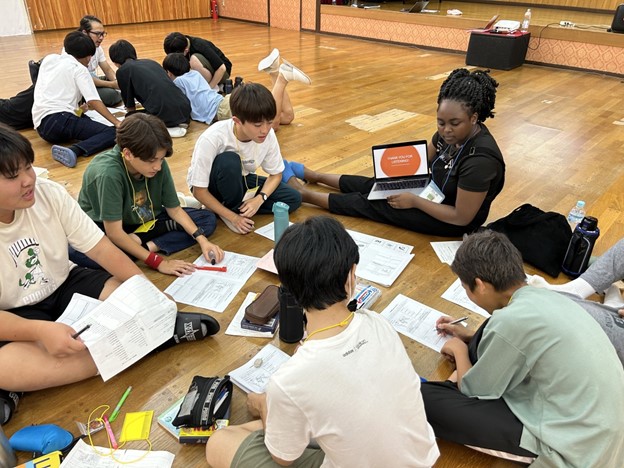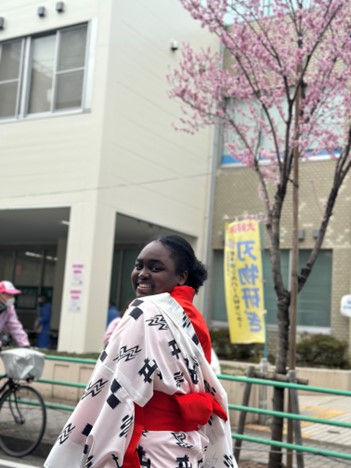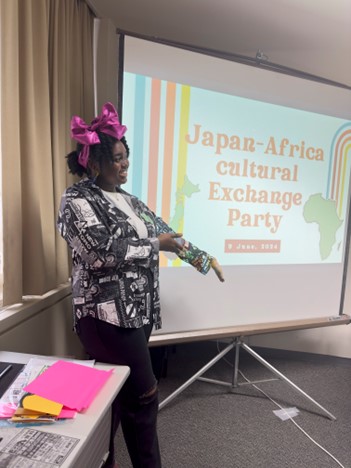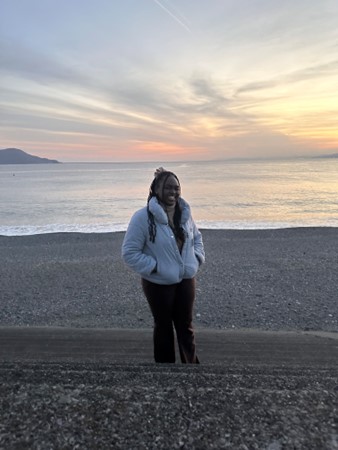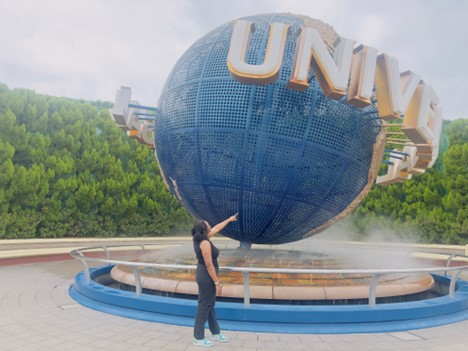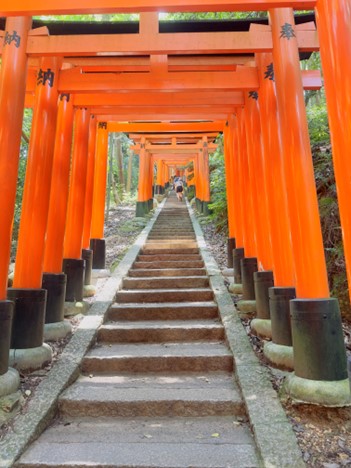[Study in Japan Report] By Rita from UNZA (Zambia)
Rita Tembo our former exchange student from?University of Zambia, who studied in Japan from Sept. 2023 to July 2024 wrote an essay of her stay in Japan.
My name is Rita Tembo and I’m from Zambia. I am currently a student at the University of Zambia studying Economics. I came to Japan on an exchange program for ten months at Tokyo University of Foreign Studies (TUFS) from September 28, 2023, to July 29, 2024. I was under the International Student Exchange Program (ISEP) and I was a recipient of the JASSO Scholarship.
It is no secret that Japan is one of the best countries to visit in the world and I got a chance to stay for close to a year on an exchange program at TUFS.? In this report I will talk about a few culture shocks I experienced living in Japan, the classes I took, some extracurricular activities and lastly my recreational activities.
CULTURE SHCOKS
While being in Japan came with so many amazing experiences, it did not come without its difficulties. Exposing myself to something new has always been a challenge, let alone a new country that comes with its own culture, language, education system and so on and so forth.
- Transport System
Coming from Zambia, where our main mode of transport is by roads, it was quite an adjustment to get used to using trains. The intricate railway system that Japan possesses is truly one of a kind. I remember the first weeks I was there, I couldn’t take a fifteen-minute train ride from the University to a nearby station called Musashisakai for fear of getting lost. It wasn’t until months later, with time and practice, that I gained confidence in moving around Tokyo with the help of google maps.
- The garbage system
Japan has a very well-organized garbage system and when you’ve lived your whole life throwing all kinds of trash into one trash can, it can be quite stressful to sort out your trash. The first time I went to throw away my trash in Japan, I stood for five minutes straight staring at four different trash cans trying to decide which dirt belonged to which bin. It took me an embarrassing amount of time to figure out where plastic goes, where paper goes and especially where Styrofoam goes. Eventually, I learned which belongs to recyclables, which belongs to burnable, and which belongs to non-burnable.
- Weather
Experiencing Japan weather was one of the most interesting parts of living there. In Zambia, there are three distinct seasons and just like Japan, each bleeds seamlessly into the next. Living in Zambia, I had the notion that Africa’s dry and hot climate makes it one of the hottest places in the world. How wrong I was to assume that before coming to Japan. Summer in Japan is heat unlike anything I’ve ever experienced. Combined with the high humidity, there’s almost no difference between you being in an onsen and you being outside. Luckily, Japan is a very technologically advanced country, so things like portable fans and cooling vests helped me get through the summer. Another aspect of the weather is the winter. Despite being so cold I could barely feel my toes some days, I was so excited to experience snow for the first time. Touching it with bare hands may have been an oversight on my part (I was convinced I had hypothermia because of how painfully cold my fingers got) but it still didn’t take away from the experience.
CLASSES
The second thing I would like to elaborate on are the classes I took at TUFS. My major at my home university, University of Zambia, is Economics and unfortunately, the only economics classes at TUFS were in Japanese so I could not take them. However, for the first time in my academic life, I had the opportunity to take classes I had always wanted to take but never got the chance to. Specifically, literature classes which allowed me to learn more about Japanese history and society. I learned about the Hiroshima and Nagasaki bombings and how it affected people’s mental health. I got to learn about slavery and racism in America by reading Mark Twain’s?Pudd’nhead Wilson?in an American literature class.? Film making class allowed me to learn about modern Japan society and had the bonus of working with others to create a film of our own. Watching movies made by Japanese creators every week taught me more about Japanese society than I would have guessed. One of the things I learned in this class was the reality of homelessness in Japan and the challenges minority immigrants face in trying to incorporate themselves in Japanese society. A few other more practical classes I took are business classes, peace and conflict studies, international cooperation and of course, Japanese language.
EXTRACURRICULAR ACTIVITIES
Staying in Japan, I had the opportunity to work part time for a multicultural organization known as Global Leaders Japan (Lbe Japan). As an international student with basic level in Japanese, working for Lbe was one of the best part time jobs I could get. Being a Global Leader meant me interacting with high school students in English and sharing my culture with them. This could be indoors with PowerPoint presentations or an outdoor tour around Tokyo, conversing as we explore. I loved working with the kids and being part of their journey in learning English. Watching them overcome their struggles or discomfort in practicing a foreign language really motivated me to continue to work on my Japanese.
I also got to take part in the famous and beautiful Sakura festival on March 1st. I had the opportunity to wear traditional Japanese clothes known as a Yukata and dance a traditional Japanese dance as we walked down the streets of Fuchu city. A big thank you to ISSA for organizing the event and providing people to teach us the dances and practice with us in preparation for the festival.
I had the opportunity to discover a community of African people on a mission to share the African culture with as many people as possible. I attended a cultural exchange party where African fabrics and dances were showcased.
?
RECREATION
Japan has plenty of places to visit, plenty of places to explore and plenty of places to try new things and I definitely took advantage of that fact as I toured and explored as many places in the country as I could manage. Some highlights I won’t ever forget;
- Sunset at the Beach
Coming from a landlocked country, I had never been to the beach before and seen an ocean until I visited one in Numazu. Needless to say, the scenic view of the sunset against the waves was one of the most beautiful things I have ever seen. To use the words of a famous quote, “I have never met a sunset I didn’t like.”
- Amusement parks
Visiting amusement parks was one of the things I wanted to do before coming to Japan. As a little girl I would watch people in movies go to amusement parks and imagine a day when I would one day ride a rollercoaster. I finally got the chance to do so and while the experience was beyond terrifying, the exhilaration I felt took me back for more.
Being in Japan, I took the opportunity to go to the best amusements parks in the world. I went to Tokyo Disney Sea and Universal Studios Japan and had the best time.
- Fushimi Inari Taisha Sembon Torii
Another memory I won’t forget soon is hiking up the famous Thousand Torii Gates in Kyoto. The journey to the top was long and strenuous but the hike up was fun enough that I didn’t give up.
There are so many memories I created in a year while staying in Japan that I can’t pick just one as my favourite. Getting to meet new and amazing people from all over the world added to the experience. I’m grateful for the opportunity granted to me that allowed me to live one of the best years of my life. A big thank you to ISSA for the activities they organized, JASSO for the aid given, and finally the? IAfp and ISEP offices and of course the University of Zambia International Relations Link Office for all your hard work in organizing the student exchange program. I hope many more students get to have the same life changing opportunity.

